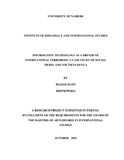| dc.description.abstract | Extremist ideologies have been pervasive throughout history be it the extreme right, the extreme left or nationalistic movements. These ideologies usually manifest as physical attacks on groups deemed as enemies of a particular cause or on selected symbolic targets meant to highlight a social grievance.
The main purpose of terrorism is to spread fear and to convey a political message through violent means which involve such methods as suicide bombing. There are concerns as to the spread of religious fundamentalism and one of the main areas under discussion in this study is the use of new sources of communication being the social media.
Social media is a new playground for destructive forces where planning of terror attacks, coordination and propaganda is carried out. As no one person or institution controls the internet, individuals can easily form social networks and recruit other likeminded persons and plan for attacks, pre-emptive and retaliatory. These online tactics will therefore have to be confronted by new counter terrorist measures.
The study therefore is seeking to explore the link between IT, Social media and terrorism in a global context, to analyse the role social media plays in terrorist recruitment of Kenyan youth, to investigate the reasons as to what makes terrorist ideologies attractive and lastly to determine the means by which terrorist ideologies can be prevented from spreading through social media.
The emerging of social media as a tool for terrorist propaganda is explained by the realist theory which highlights the politics of dominance and this theory as used by Hans Morgenthau implies that politics is merely a struggle for power and it can take the form of morality or reason to accomplish its objectives.
In this regard, religious terrorism is a political cause disguised in the form of morality and conservatism that seeks to achieve and maintain dominance over other forms of power notably liberal democracies.
The assumptions rising from this study is that IT and specifically social media influence the spread of terrorism globally, social media plays the most effective role in the recruitment of Kenyan youth into terrorism, inequalities and deprivations are the major
viii
causes of terrorism in Kenya and that the spread of terrorist ideologies can be prevented by monitoring the internet, community policing and employing effective counterterrorism legislation.
The study also employs descriptive survey and data was collected from both primary and secondary sources.
The findings from the study affirmed that indeed social media influences radicalization of the youth in Kenya and that social inequalities influence the decision of deprived youth to participate in terror related activities.
In this regard, policy makers must counter terrorist ideologies by providing alternatives to online terrorist propaganda, promote economic empowerment, promote community policing, employ intelligence both human and computerised to identify terrorist networks, provide support to moderate religious leaders as they influence adherents and implement effective counter terror legislation that does not discriminate on the basis of ethnicity or religion but one that ensures that legitimate terror suspects are prosecuted.
For academics, it is imperative that the use of social media in the context of international politics as a struggle of power should be understood and further implemented to incorporate and build on the existing knowledge to prevent radicalization through the medium. | en_US |



